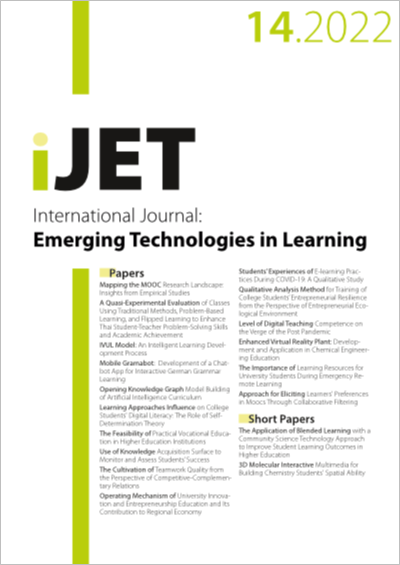IVUL Model: An Intelligent Learning Development Process
DOI:
https://doi.org/10.3991/ijet.v17i14.31527Keywords:
universal learning process, intelligent learning process, virtual learning process, IVUL modelAbstract
The purposes of this research study are to develop an intelligent virtual universal learning (IVUL) model and to evaluate its appropriateness. The study consisted of two phases. Phase 1 involved the development of the IVUL model for univer-sal learning. The conceptual frameworks and theories in the documents and re-search studies on universal design for learning, intelligent learning and virtual learning were studied by the researchers. All main components were then synthe-sised to design the IVUL model. This process can be divided into three main steps: engagement, representation, and action and expression. Each step has sub-steps: access, build and internalise. However, the details of these are dependent on the main steps. The second component is the intelligent learning process, an important process of the model that drives learners to automatically learn by themselves. Artificial intelligence is used as a crucial component that promotes and supports each learner to meet learning goals and objectives according to the universal learning model. The third component is the virtual learning process, which results in learning through computer environments and the Internet. Phase 2 involved an evaluation of the appropriateness of the IVUL model, with in-depth interviews with 20 experts in education and digital technologies. The appropriate-ness of the model was evaluated using the 5-point Likert scale. The findings show that the designed IVUL model can be used for learning development at the highest level.
Downloads
Published
How to Cite
Issue
Section
License
Copyright (c) 2022 Sakchai Chaiyarak; Professor Dr. Prachyanun Nilsook, Associate Professor Dr. Panita Wannapiroon

This work is licensed under a Creative Commons Attribution 4.0 International License.


